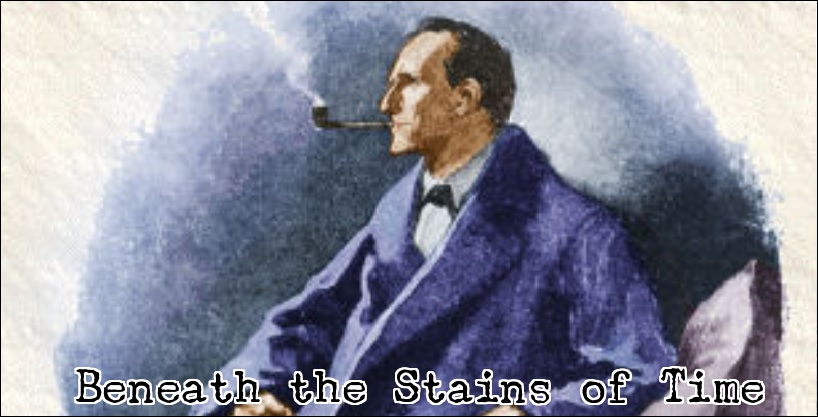"You never count on the perfect plan. The perfect plan, it has too many moving parts... you got to expect the perfect plan to fail."- Nathan Ford (Leverage)
There are a number of impossible
situations of the miscellaneous kind, such as trains being whisked away in
between two stations or an entire house vanishing over night, but they are
uncommon because they're hard to do convincingly – not to mention the lack of
wriggle room for an original solution. The doppelgänger of folklore is
another example of an inviting premise trammeled by a limited amount of options
to work with, if the supernatural has to be kept outdoors.
 Helen McCloy's suspenseful Through a
Glass, Darkly (1950) and Time Waits for Norman (1998) from the
Jonathan Creek TV-series seemingly did everything that was (fairly) possible
with the premise, however, Charlotte Armstrong found a nifty and clever way to
extract some extra mileage out of the doppelgänger-ploy in The Dream
Walker (1955) – which has also been published as Alibi for Murder.
Helen McCloy's suspenseful Through a
Glass, Darkly (1950) and Time Waits for Norman (1998) from the
Jonathan Creek TV-series seemingly did everything that was (fairly) possible
with the premise, however, Charlotte Armstrong found a nifty and clever way to
extract some extra mileage out of the doppelgänger-ploy in The Dream
Walker (1955) – which has also been published as Alibi for Murder.
Armstrong's twist lies in not coming up
with a brand new solution to the problem, but showing the reader the ugly,
plain woodwork behind the plot to assassinate the character of the respected
John Paul Marcus. The reader knows from the offset who, why-and how and this
makes The Dream Walker an inverted impossible crime story (another
rarity), but the advantage is that the astral projection trick can be played up
to full effect for story telling purpose. You're sort-of committing yourself
with a locked room premise to deliver some kind of clever or original trickery
at the end.
The Dream Walker tells the reader from the beginning Raymond Pankerman,
third-generation millionaire, financiered the smear campaign against Marcus,
after the latter alerted Uncle Sam of the illegal activities of the former, by
offering a fat reward to Kent Shaws – brains of the outfit and slightly
unhinged. Cora Steffani and Darlene Hite round out the team. Shaw's crazy
scheme begins like a benevolent urban legend after Cora passes into a trance
for the first time and dream walks. Miles away. Usually in another state of the
country. There were even people who confirm to have talked to Cora while she
was laying unconscious in another circle consisting of impeccable witnesses
with no reason to lie.
While suggestions of an elaborate
publicity stunt and "there are more things in Heaven and Earth" are
being volleyed around, the reader can feel smug the entire time for knowing
more than the characters trying to figure out what's happening. You're far more
willing to go along with the insane scheme, because the inverted structure of
the story makes the reader feel like a silent partner in the plot. You can
simply sit back and look bemused at the unfolding events, complimenting
Armstrong when she throws in an uncontrollable variable in the perfect plan of
the foursome – forcing the dream walker to stumble over a body. It does,
however, give the story traction in the press and Marcus eventually finds
himself in a compromising position and nobody believes it when everybody
swears, Marcus included, he didn't receive an envelope from the dream girl.
As noted in my review of The Case of the Weird Sisters (1943), it was Patrick, blogging At the Scene of the Crime, who propelled Charlotte Armstrong higher up my wish list (thanks!) and
have to agree on two of his main points: it’s a strong statement against the witch
hunts of the McCarthy-era and Armstrong knew how to pen a suspenseful story. Once
again, this simple trick, made complicated for the sake of being complicated,
worked admirably because of the inverted angle for the reader. The moment
everyone in the story has figured it out the reader doesn't respond: oh, there
were two of them, because that was never the point. Armstrong could focus
completely on the characters and their exploits.
I have to add that I still think Patrick Quentin's Black Widow (1952) is the best persecution / suspense story of its kind, but The Dream Walker comes in as a close second. So I'll definitely be
returning to Armstrong.

Sounds great TC, thanks very much - I have never read her work but I really will have to after such positive review by you and Patrick! Having said that, your title still fooled me as I thought it was going to be an Ellery Queen review ...
ReplyDeleteWell, I wanted to use a pun as a post-title (see last sentence), but decided on a spot of maturity and "Double, Double" was the only normal title I could think of.
Delete